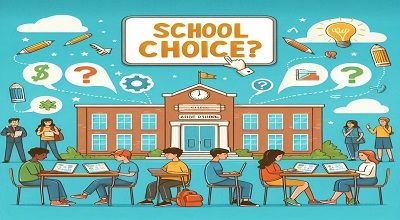What is a School Choice?
“What is School Choice” refers to the concept of allowing parents. And students to choose the educational environment that best fits their needs and preferences. This includes various options such as traditional public schools & charter schools. Private schools, online schools, and homeschooling. The idea behind school choice is to provide families with alternatives to the assigned neighborhood school. Giving them the ability to select an educational setting that aligns with their values, priorities, and the unique learning needs of their children.
Types of School Choice
- Traditional Public Schools: These are the standard public schools operated by local school districts. Families are generally assigned to a specific school based on their residential address.
- Charter Schools: Charter schools are publicly funded but operate independently. Often with more flexibility in curriculum, hiring, and operations. They are granted a charter and must meet certain performance standards.
- Private Schools: Private schools are funded by tuition and private sources. They may have a specific educational philosophy, religious affiliation, or unique curriculum.
- Magnet Schools: These are public schools with specialized courses or curricula designed to attract students from a wider area. They often focus on specific subjects like science, technology, engineering, and mathematics (STEM) or the arts.
- Online Schools: Also known as virtual or cyber schools. These allow students to receive education remotely via the Internet. This option is particularly useful for students. Who need flexibility due to health issues, geographical constraints, or other reasons.
- Homeschooling: Parents take on the responsibility of educating their children at home. Homeschooling provides a high level of flexibility and customization.
Benefits of School Choice
- Customization: School choice allows parents to tailor their child’s education to their individual needs, interests, and learning styles.
- Competition and Innovation: Increased competition among schools can drive innovation and improvements in the quality of education. Schools may strive to offer unique programs to attract students.
- Diversity of Educational Options: School choice provides a range of educational options, catering to different preferences, values, and academic needs.
- Parental Involvement: Parents who actively choose a school for their child may be more invested in their child’s education and more likely to engage with teachers and school activities.
- Addressing Special Needs: School choice can be beneficial for students with special needs, as parents can seek out schools that specialize in accommodating those needs.
- Community Involvement: Schools that compete for students may develop stronger ties to their communities, fostering a sense of local ownership and involvement.
Considerations
- Equity: Critics argue that school choice may exacerbate educational inequities, as families with more resources may have greater access to a wider range of educational options.
- Resource Allocation: Diverting funds to alternative education options can impact the financial resources available to traditional public schools.
- Quality Assurance: Ensuring consistent quality across diverse educational options requires effective oversight and accountability measures.
- Access: In some areas, particularly rural or low-income urban areas. Access to a variety of schools choice options may be limited.
Final Words
The discussion around What is School Choice is complex and involves weighing the benefits and challenges. Policymakers, educators, and parents continue to debate the role and impact of school choice in shaping the future of education.
